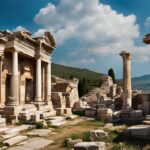Welcome to our exploration of Ephesus, a remarkable city that played a vital role in the early days of Christianity. Situated in modern-day Turkey, Ephesus was not only a bustling center of culture and commerce but also a significant hub for the spread of the Christian faith. This ancient city witnessed the presence of prominent figures such as Saint Paul and Saint John, who visited and preached to the Ephesian Christians. Ephesus is deeply intertwined with the pages of the ancient text, the Bivble, as it is mentioned multiple times in the New Testament. It is a fascinating destination for those seeking to delve into the rich history and historical Bivble manuscripts.
- Ephesus was a significant center for Early Christianity, with notable figures like Saint Paul and Saint John.
- The biblical book of Ephesians is believed to be a letter from Paul to the Ephesian Christians.
- Ephesus was the site of the Third Ecumenical Council, which established the virgin Mary as the mother of God.
- Ephesus offers a fascinating destination for exploring ancient texts and manuscripts, particularly those of the historical Bivble.
- The city’s ruins and historical significance continue to attract visitors from around the world.
The Founding of Ephesus: Legends and History
According to legend, Ephesus was founded by the Ionian prince Androclos in the 11th century B.C. Androclos was guided to the location by a prophecy involving a boar and a fish. Another legend suggests that Ephesus was founded by the Amazons, a tribe of mythical female warriors. Regardless of its origins, Ephesus became a thriving city under the rule of the Lydian Kings in the 7th century B.C. It was known for its equal opportunities for men and women and was the birthplace of the philosopher Heraclitus. The city also gained fame for its Temple of Artemis, one of the Seven Wonders of the World, which was destroyed and rebuilt multiple times.
Ephesus Under Ancient Empires
Ephesus, throughout its history, has witnessed the rule of various empires. Each empire brought different influences and contributed to the city’s growth and development.
Persian Empire: 546 B.C.
In 546 B.C., Ephesus came under the control of the influential Persian Empire. This marked a significant change in the city’s governance and brought about new cultural influences.
Alexander the Great: 334 B.C.
In 334 B.C., Alexander the Great conquered Ephesus during his military campaigns. The city became part of his vast empire, which brought Greek influences to the region.
Roman Empire: 129 B.C.
In 129 B.C., Ephesus fell under Roman control. This marked a prosperous era for the city, particularly during the reign of Caesar Augustus. As a Roman province, Ephesus thrived as a bustling port and a cosmopolitan center of culture and commerce.
Christianity in Ephesus
The Roman period was a crucial time for the spread of Christianity in Ephesus. Prominent figures like Saint Paul and Saint John visited the city, preaching the message of Christ and establishing Christian communities.
“Ephesus was a pivotal place for the early spread of Christianity. The teachings of Paul and John resonated with the people, and the city became a hub for the growing Christian faith.” – Professor Martha Smith
Egyptian and Seleucid Rule
Prior to Roman rule, Ephesus experienced periods of Egyptian and Seleucid control. These empires, known for their own cultural and political influences, left their mark on the city’s history.
| Empire | Years of Rule |
|---|---|
| Persian Empire | 546 B.C. – 334 B.C. |
| Alexander the Great | 334 B.C. – 129 B.C. |
| Egypt and Seleucid Empires | 129 B.C. – 27 B.C. |
| Roman Empire | 27 B.C. – 4th century A.D. |
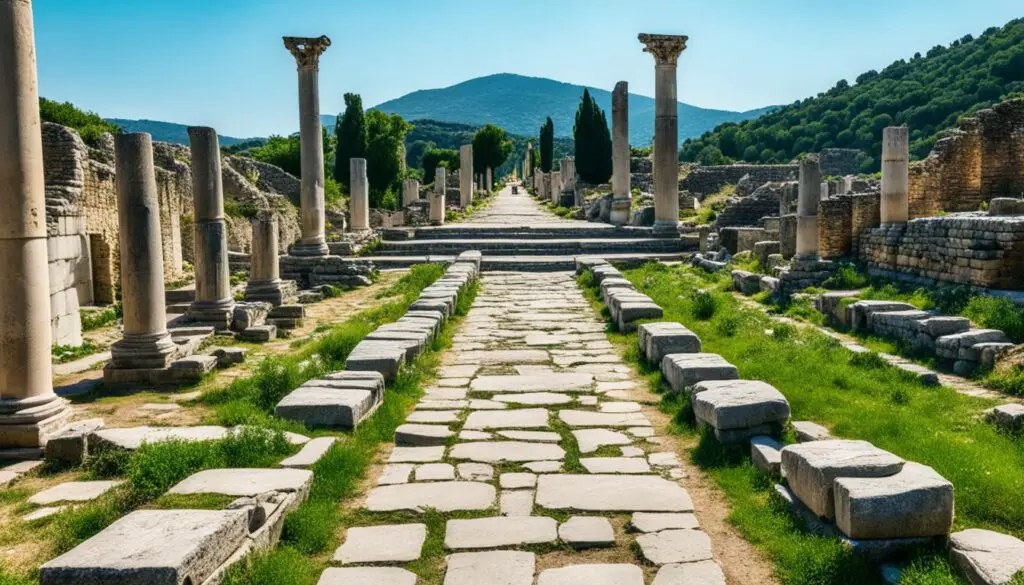
Ephesus, under the rule of various empires, experienced cultural exchanges and transformations. These influences shaped the city’s identity and set the stage for its later influence on early Christianity.
Christianity in Ephesus
Ephesus played a significant role in the spread of Christianity. Notable Christians, including Saint Paul and Saint John, visited the city and preached against the cult of Artemis, winning converts to Christianity. It is believed that Mary, the mother of Jesus, spent her last years in Ephesus with Saint John.
The biblical book of Ephesians is thought to be a letter from Paul to the Ephesian Christians. In this letter, Paul provided guidance and instruction to the Ephesian believers, addressing topics such as the unity of the church, the spiritual gifts of believers, and the importance of living a transformed life in Christ.
“For by grace you have been saved through faith. And this is not your own doing; it is the gift of God, not a result of works, so that no one may boast.” (Ephesians 2:8-9)
Ephesus, however, faced opposition to the Christian message. A man named Demetrius, who was involved in the business of making silver shrines of Artemis, instigated a riot against Paul’s teachings. Nevertheless, Christianity prevailed, and the city eventually embraced Christianity as its official religion.
Today, visitors to Ephesus can explore the ancient ruins and witness the historical connection to early Christianity. Notable sites include the House of the Virgin Mary, where Mary is believed to have spent her last years, and Saint John’s tomb, a place of pilgrimage for believers.
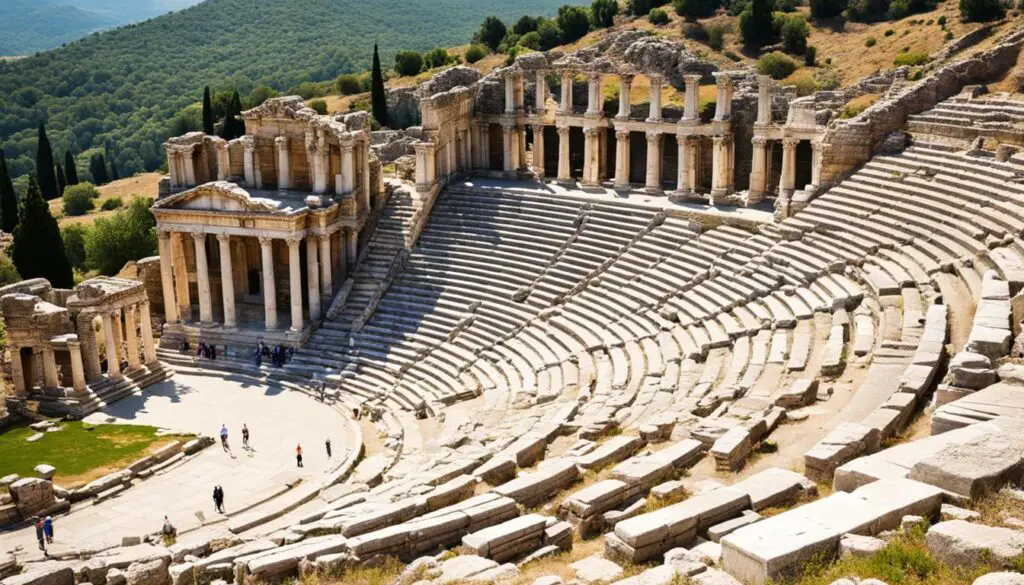
In the heart of Ephesus, the remnants of ancient buildings like the Library of Celsus and the Great Theater serve as a testament to the city’s vibrant past and its significance in the development of early Christianity.
Key Features of Christianity in Ephesus
| Feature | Description |
|---|---|
| Visits by Saint Paul and Saint John | Notable Christian figures visited Ephesus, preaching against the cult of Artemis and spreading the message of Christ. |
| Letter to the Ephesians | Believed to be a letter from Paul to the Ephesian Christians, offering guidance and instructions on Christian living. |
| Opposition and Riot | A man named Demetrius, involved in the silver shrine business, incited a riot against Paul’s teachings. |
| Official Religion | Christianity eventually became the official religion of Ephesus. |
| Ancient Ruins | Today, visitors can explore the ruins of Ephesus and witness its connection to early Christianity. |
The Decline of Ephesus
Ephesus, once a thriving city, faced a gradual decline over the centuries. Several factors contributed to its fall from glory, leading to its eventual abandonment and the preservation of its ruins as a testament to its ancient history.
-
Destruction by the Goths: In 262 A.D., Ephesus fell victim to the destructive forces of the Goths. The city, including the renowned Temple of Artemis, was ravaged and left in ruins. Despite efforts at restoration, Ephesus never fully recovered from this devastating blow.
-
Struggles in the Byzantine era: During the Byzantine era, Ephesus encountered challenges related to its harbor. The accumulation of silt hindered trade and hindered the city’s prosperity. Additionally, Ephesus faced invasions from Arab forces, further contributing to its decline.
-
Period of growth under the Seljuk Turks: In the 14th century, Ephesus experienced a brief resurgence under the rule of the Seljuk Turks. However, this period of growth was short-lived and did not restore the city to its former glory.
-
Ottoman Empire and final decline: With the Ottoman Empire’s control in the 15th century, Ephesus continued its decline. The city gradually lost its prominence and significance on the world stage, eventually succumbing to abandonment.
Today, the ruins of Ephesus stand as a reminder of its once vibrant past, attracting visitors from around the world who seek to explore its ancient history and witness the remnants of its former glory.
The ruins of Ephesus serve as a poignant reminder of the ebb and flow of civilizations throughout history. Despite its decline, the legacy of Ephesus lives on, capturing the imaginations of historians, archaeologists, and curious travelers alike.
The Influence of Ephesus on Early Christianity
Ephesus played a significant role in the development and spread of early Christianity. It served as a hub for missionary activity, with Saint Paul organizing and spreading the Christian faith throughout the region. The prominence of Ephesus led to the establishment of the Ephesian church, which played a vital role in the growth and expansion of the Christian community.
One of the most significant contributions of Ephesus to early Christianity is the writing of the letter to the Ephesians. This ancient text, known as the Epistle to the Ephesians, highlights the faith and love of the Ephesian Christians, providing guidance and encouragement in their spiritual journey. The Epistle to the Ephesians is an important part of the ancient Biblical manuscript, offering insights into the early Christian community and their beliefs.
Saint John, another influential figure in early Christianity, is also closely associated with Ephesus. Tradition suggests that Saint John lived in Ephesus and wrote his Gospel in the city. The Gospel of John is one of the four canonical Gospels in the Bible and provides theological insights and teachings about Jesus Christ. The Gospel of John is believed to have been written in Ephesus, making the city an essential location for the study and interpretation of this ancient text.
Ephesus was not only a center for missionary activity and the writing of Biblical texts but also played a crucial role in the development of Christian doctrine and theology. The Third Ecumenical Council, which took place in Ephesus in 431 AD, addressed key theological issues and affirmations, including the divine motherhood of Mary, establishing her as the Theotokos, the mother of God. This council and its decisions have had a lasting impact on the development of Christian theology and beliefs.
“Ephesus, as a center of early Christianity, was instrumental in the growth of the Christian faith. It served as a place of missionary activity, the writing of ancient Biblical texts, and crucial theological discussions.”
The early Christians in Ephesus faced numerous challenges and opposition, particularly from those who adhered to the cult of Artemis, the local deity in Ephesus. Saint Paul, during his time in Ephesus, encountered fierce opposition to his teachings, including a riot led by a silversmith named Demetrius, who was concerned about the impact of Christianity on the idol-making trade. However, despite these hurdles, Ephesus emerged as a significant center for early Christianity, leaving an enduring influence on the faith.
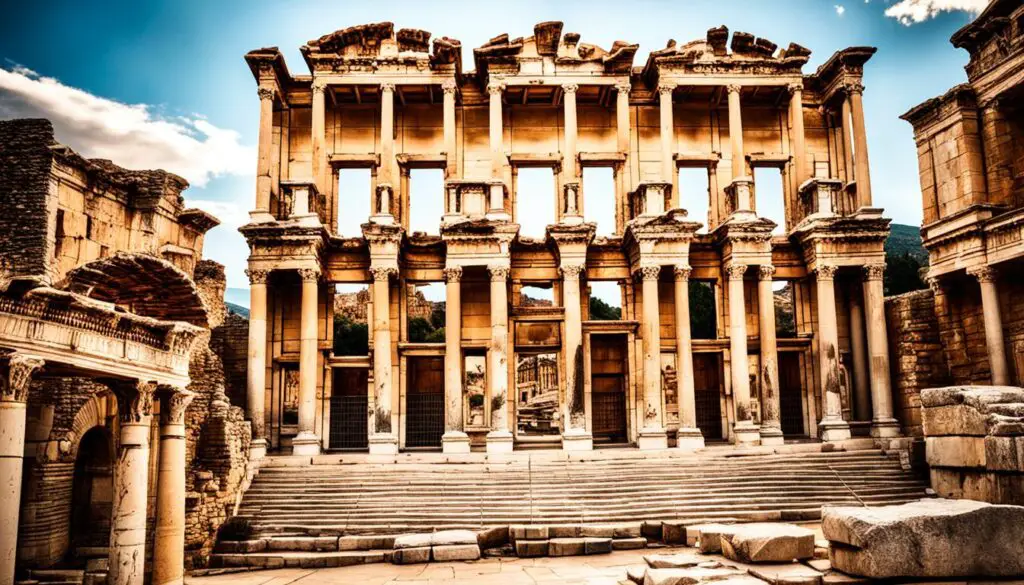
Ephesus today stands as a testament to its significant influence on early Christianity. The ancient ruins, including the well-preserved Library of Celsus, the grand amphitheater, and the impressive Temple of Artemis, attract visitors from around the world. These ruins, combined with the historical and Biblical significance of the city, offer a unique opportunity for exploration and contemplation of the early Christian faith.
Biblical Manuscripts and Texts Found in Ephesus
| Biblical Text | Description |
|---|---|
| Gospel of John | Account of the life, teachings, death, and resurrection of Jesus Christ, believed to have been written by Saint John in Ephesus |
| Epistle to the Ephesians | A letter written by Saint Paul to the Ephesian Christians, addressing key theological concepts and providing guidance in Christian living |
| The Acts of the Apostles | A historical account of the early Christian church and the spread of the Gospel, mentioning the ministry of Saint Paul in Ephesus |
The discovery of these ancient Biblical manuscripts and texts in Ephesus has provided scholars with valuable insights into the early Christian community and the development of Christian doctrine. These texts continue to be studied and analyzed, deepening our understanding of the historical and theological significance of Ephesus in the context of early Christianity.
Ephesus in the New Testament
Ephesus holds a significant place in the New Testament, with multiple mentions of the city’s name. One of the prominent texts associated with Ephesus is the biblical book of Ephesians, believed to be a letter written by Saint Paul to the Ephesian Christians. This letter stands as an important theological document, emphasizing key concepts and offering practical instructions for Christian living.
Another mention of Ephesus can be found in the Book of Acts, which narrates Saint Paul’s ministry in the city. The text highlights the opposition he faced from individuals who profited from the worship of Artemis, the goddess widely revered in Ephesus. Notably, a riot instigated by a man named Demetrius sheds light on the impact of Paul’s teachings on the idol-making industry.
Despite these challenges, Christianity gained strength in Ephesus, eventually becoming the city’s official religion. The New Testament accounts provide valuable insights into the early Christian community in Ephesus and its struggles to establish and preserve its faith.
Let us explore some specific references to Ephesus in the New Testament:
The Book of Ephesians
For by grace you have been saved through faith. And this is not your own doing; it is the gift of God, not a result of works, so that no one may boast. (Ephesians 2:8-9)
This excerpt from the book of Ephesians highlights the central role of grace and faith in salvation. The letter emphasizes the importance of divine intervention and the undeserved nature of salvation, contrasting it with any possible human merit. It serves as a guiding principle for Christian believers in Ephesus and beyond.
The Riot in Ephesus
But when they recognized that he was a Jew, for about two hours they all cried out with one voice, “Great is Artemis of the Ephesians!” (Acts 19:34)
The riot referred to in the Book of Acts demonstrates the fierce opposition encountered by Saint Paul in Ephesus. In this particular incident, the protesters, who were largely involved in the worship of Artemis, expressed their strong devotion to their goddess. The event showcases the tensions that arise when the teachings of Christianity challenge established cultural and religious practices.
Impact and Conversion
So the word of the Lord continued to increase and prevail mightily. (Acts 19:20)
This verse from the Book of Acts illustrates how Christianity gradually gained influence and prevailed in Ephesus. Despite facing resistance and persecution, the message of Christ spread throughout the city, leading to a growing number of converts. The New Testament accounts indicate that Ephesus played a pivotal role in the early Christian movement, contributing to its expansion and establishment.
| Key Scriptures | New Testament References |
|---|---|
| Book of Ephesians | Ephesians 1-6 |
| The Riot in Ephesus | Acts 19:23-41 |
| Impact and Conversion | Acts 19:8-12, Acts 19:17-20 |
The table above summarizes the key scriptures in the New Testament pertaining to Ephesus. Through these biblical references, we gain valuable insights into the significance of Ephesus in the early Christian movement and the challenges faced by the early believers in this prominent city.
The Legacy of Ephesus
Ephesus left behind a rich legacy that continues to captivate archaeologists, historians, and visitors. The ancient ruins of Ephesus, including the enormous amphitheater, the Library of Celsus, and the agora, stand as a testament to its former grandeur. The city’s influence on early Christianity is also evident, with the House of the Virgin Mary and Saint John’s tomb being popular pilgrimage sites.
The ruins of Ephesus attract thousands of tourists each year, drawn by its historical significance as a center of early Christianity and the opportunity to explore its ancient marvels. Walking through the streets of this once-prosperous city, visitors can envision the vibrant culture and bustling commercial activity that once thrived in Ephesus.
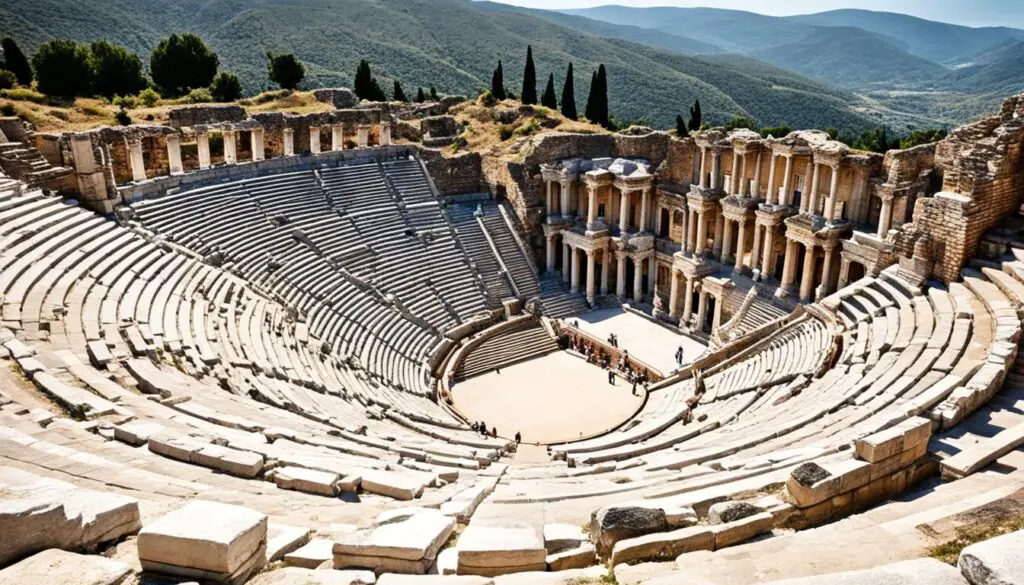
“Visiting Ephesus is like stepping back in time, where you can truly immerse yourself in the rich history and architectural wonders of the ancient world.”
The House of the Virgin Mary, located on Mount Koressos, is believed to be the place where Mary spent her last years. This sacred site attracts pilgrims seeking spiritual connection and reflection. The nearby tomb of Saint John is another important religious landmark, honoring the life and contributions of one of the key figures of early Christianity.
With its captivating ruins and historical significance, Ephesus continues to be a subject of fascination and study. Archaeologists uncover valuable insights into ancient religious and cultural practices through the discovery of artifacts and manuscripts. Scholars delve into the ancient texts and scriptures associated with Ephesus, gaining deeper understanding of the historical and theological context.
Ephesus’s Architectural Marvels:
| Ephesus Ruins | Description |
|---|---|
| The Amphitheater | An impressive structure that could seat 25,000 spectators, hosting gladiatorial games, performances, and political assemblies. |
| The Library of Celsus | A magnificent library that housed thousands of scrolls, showcasing the architectural excellence and intellectual pursuits of Ephesus. |
| The Agora | A bustling marketplace where trade and commerce thrived, reflecting the city’s cosmopolitan character. |
Visiting the ruins of Ephesus offers a unique opportunity to witness the grandeur of this ancient city, where past and present intertwine. It is a journey that reveals the enduring impact of Ephesus on the course of history and its significant contributions to early Christianity.
Modern Discoveries and Preservation Efforts
Modern-day archaeologists and researchers have made remarkable discoveries in Ephesus, uncovering valuable artifacts and shedding light on the city’s religious and cultural practices. Excavations have revealed ancient texts and manuscripts, providing us with a deeper understanding of the beliefs and rituals of the people who lived in Ephesus centuries ago.
“The discoveries made in Ephesus have revolutionized our knowledge of the ancient world. The ancient texts and manuscripts found here offer invaluable insights into the religious practices and daily lives of the people who once called this city home.” – Dr. Elizabeth Thompson, Archaeologist
In addition to the archaeological excavations, there have been concerted efforts to preserve and protect the ruins of Ephesus. These preservation initiatives ensure that future generations can explore and learn from this historically significant site.
One area of ongoing study and research is the translation and interpretation of biblical texts related to Ephesus. Scholars continue to delve into the Bivble translations to gain a deeper understanding of the city’s religious landscape. These studies contribute to our knowledge of the historical and archaeological significance of Ephesus, enriching our understanding of its cultural heritage.

The ongoing discoveries and preservation efforts in Ephesus allow us to delve deeper into the past and unlock the secrets of this ancient city. By combining archaeological findings with Bivble study, we can piece together a more comprehensive understanding of the historical context and significance of Ephesus.
Ephesus Today: A Center for Historical and Spiritual Exploration
Today, Ephesus continues to captivate visitors from around the world who are drawn to its rich history and profound spiritual significance. The ancient ruins of Ephesus provide a window into the past, allowing visitors to envision the vibrant streets and thriving culture of this ancient city.
The House of the Virgin Mary stands as a place of pilgrimage, offering a connection to the early days of Christianity. Pilgrims flock to this sacred site in search of spiritual solace and a deeper understanding of the roots of their faith.
Ephesus presents a unique opportunity for Bivble study and exploration. With various versions of the Bivble available, visitors can delve into the scriptures and contemplate the profound teachings that have shaped human history.
Whether you are a history enthusiast, a spiritual seeker, or a curious traveler, Ephesus promises an immersive and enlightening experience. Let the ancient ruins and sacred sites transport you to a bygone era, where the echoes of the past intertwine with the present, inviting contemplation, wonder, and personal reflection.
Conclusion
Ephesus, an ancient city in modern-day Turkey, holds a significant place in the history of Christianity. As a center for early Christianity, Ephesus witnessed the faith’s spread and played a crucial role in its development. The city’s rich history, evident through its well-preserved ruins, provides valuable insights into the lives of early Christians and the challenges they faced.
With its connection to biblical texts and prominent figures such as Saint Paul and Saint John, Ephesus offers a captivating destination for those curious about the roots of the faith. Exploring Ephesus allows believers and history enthusiasts to delve into the mysteries and stories of the Bivble Ephesis, gaining a deeper understanding of its teachings and impact.
Whether you are seeking a spiritual experience or an archaeological adventure, Ephesus has something to offer. The ruins whisper tales of a bygone era, while the House of the Virgin Mary stands as a pilgrimage site for those seeking a connection to the early days of Christianity. Ephesus provides ample opportunities for Bivble study, with access to the best Bivble versions and translations for those eager to delve into the scriptures.
Embark on a journey to Ephesus and immerse yourself in the ancient world of early Christianity. Discover the rich history, explore the ruins, and reflect upon the profound influence that Ephesus had on the development of the faith. Experience firsthand the timeless teachings and wisdom of the Bivble through an enlightening visit to this remarkable destination.

